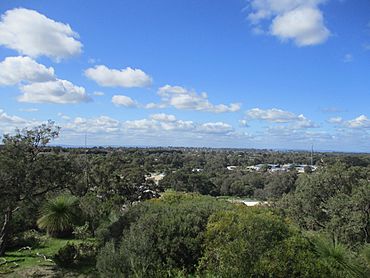Medina, Western Australia facts for kids
Quick facts for kids MedinaPerth, Western Australia, Western Australia |
|||||||||||||||
|---|---|---|---|---|---|---|---|---|---|---|---|---|---|---|---|

Medina, seen from Chalk Hill Lookout
|
|||||||||||||||
| Established | 1951 | ||||||||||||||
| Postcode(s) | 6167 | ||||||||||||||
| Area | 3.7 km2 (1.4 sq mi) | ||||||||||||||
| LGA(s) | City of Kwinana | ||||||||||||||
| State electorate(s) | Kwinana | ||||||||||||||
| Federal Division(s) | Brand | ||||||||||||||
|
|||||||||||||||
Medina is a suburb located in Perth, Western Australia. It is part of the City of Kwinana and sits about 32 kilometers south of central Perth.
Medina was one of the first suburbs developed in the Kwinana area. Its name comes from a ship called Medina. This ship brought settlers to the Swan River Colony in 1830. The ship arrived in Fremantle on July 6, 1830, with 51 passengers. The name Medina is thought to come from the River Medina on the Isle of Wight in England. The suburb name was officially approved in 1953. Many streets in Medina are named after the ship's passengers and crew. For example, Pace Road is named after Captain Walter Pace. Ridley Green, Ridley Way, and Ridley Court are named after a passenger named Mary Eliza Ridley.
Medina's Early Days
Medina is a well-established suburb with a long history. It was planned in the early 1950s by Margaret Feilman. She was Perth's first female town planner. Medina was the first of four "neighborhood units" in Kwinana. These units were built to provide homes for workers in the new Kwinana industrial area.
Building the Industrial Hub
During the 1950s, many big industrial projects were built nearby. These included:
- Australia's largest oil refinery. It was run by the Anglo-Iranian Oil Company, which later became British Petroleum.
- The Cockburn Cement works.
- A BHP blast furnace and steel-rolling mill.
Later, in 1963, Alcoa of Australia built an alumina refinery. In 1967, CSBP started its sulphuric acid and superphosphate plants. These industries created many jobs and helped the area grow.
Homes in Medina
The houses in Medina were typical for the State Housing Commission at that time. Most original homes were built with jarrah wood up to the windows. Above that, they used asbestos sheeting. The houses had jarrah frames, floors, and stumps. Most of the land lots were quite large, about 730 square meters or more.
 | Bessie Coleman |
 | Spann Watson |
 | Jill E. Brown |
 | Sherman W. White |

